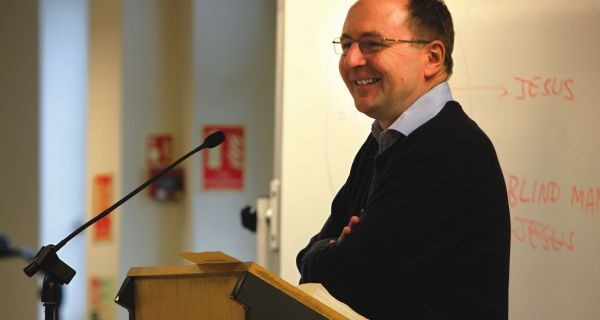Every generation must consider how to pass on their faith to the next. In the same way, every next generation must choose to learn from the faith of those who’ve gone before. As Paul encouraged Timothy to let no one despise him for his youth (1 Timothy 4:13), he also challenged Timothy to not despise the wisdom of his elders (1 Timothy 4:14). Both are needed.
I recently sat down with Christopher Ash of the Cornhill Training Course and Gary Millar of Queensland Theological College at Basics 2014 in Cleveland, Ohio. Both men served as pastors in local church ministry and now train the next generation for gospel ministry. We discussed pressing challenges for current students—especially related to lofty expectations for ministry success—and advice on preaching—particularly how to prepare with commentaries and stay focused on Jesus no matter the text.
As both of you are now responsible for training the next generation for local-church ministry, what do you see as the most pressing challenges for students?
 Christopher Ash: In the UK some of our churches have a really strong culture of training, such that when keen young Christians appear, they get leaned on quite significantly to go into some kind of apprenticeship or pastoral training. And it’s a wonderful swing of the pendulum, from a kind of mystical view that one should “not ever do it unless you cannot not do it,” a view often attributed to Spurgeon and Lloyd-Jones (though I don’t think that connection is as strong as often suggested). So the strong culture of training is a terrific swing of the pendulum, but it can go a bit far.
Christopher Ash: In the UK some of our churches have a really strong culture of training, such that when keen young Christians appear, they get leaned on quite significantly to go into some kind of apprenticeship or pastoral training. And it’s a wonderful swing of the pendulum, from a kind of mystical view that one should “not ever do it unless you cannot not do it,” a view often attributed to Spurgeon and Lloyd-Jones (though I don’t think that connection is as strong as often suggested). So the strong culture of training is a terrific swing of the pendulum, but it can go a bit far.
I think for some of our students all they have ever known are big—so called “training”—churches. Perhaps it’s where they’ve been converted and nurtured. And when they have some ability to lead a Bible study or to teach, everyone else says, “You ought to do this.” I think it’s quite hard for them sometimes to judge, “Do I have the character for this? Am I gifted for this?”
 Gary Millar: We see the same phenomena in Australia that Christopher is describing. The pendulum has swung. The expectation is that if you are a keen Christian then you should end up in some kind of ordained ministry. But I think the biggest pressure on some of our students is actually the expectation of success.
Gary Millar: We see the same phenomena in Australia that Christopher is describing. The pendulum has swung. The expectation is that if you are a keen Christian then you should end up in some kind of ordained ministry. But I think the biggest pressure on some of our students is actually the expectation of success.
In the last couple of decades there has been a shift from people entering seminary with the expectation or goal that they would be a faithful pastor somewhere (and that could be anywhere small or large) with an awareness that a few people will end up in large ministries. Whereas today, my observation is that most of the people we are training want to be church planters or lead pastors of large and successful churches.
Now in Queensland in particular this expectation creates a dilemma because there are lots of small rural churches, which at a human level are not dripping with potential. And the kind of ministry needed in these churches is faithful, small-time ministry over many years. You still want to work for conversions, but the overall numerical growth of the church might not change.
So we are working hard to recalibrate expectations, because I think that for all the positive influence from some of the leaders of the new Reformed movement, one of the slightly negative effects is that in situations that do not mirror metropolitan America, young pastors still expect that they will have a similar kind of ministry—which is a significant challenge.
When it comes to considering the task of preaching, what do you recommend to young preachers for striking a balance in doing the hard exegetical work themselves compared to consulting a commentary or listening to someone else’s sermon on the same text?
GM: Reading the text has to be the priority. That’s where we have to start. Our whole approach in seminary is to begin by teaching people how to read the Bible—trying to be sensitive to the meaning and to the tone of the text. With all of our emphasis on training, it is important that we really say that the first thing we must do is allow God to speak to us through the text. There is a fairly obvious difference between a talk that is given when it has been internalized by the speaker and when it hasn’t.
We encourage our students to ask questions of the text before they go to a commentary or a sermon, so they already have an idea of what they are looking for. It’s an art that takes time to develop, finding what works best for you, because we all have people we admire, and it’s hard sometimes to not just go with what they’ve written. Learn to consult them only at the end of your process, not the beginning.
CA: I agree entirely with what Gary has said about immersing ourselves in the text, listening to the text, grappling with the text. So at Cornhill we emphasize this process to our students, but sometimes they mishear us as discouraging any engagement with commentaries. And we’ve all heard expositions where you wonder if the person did in fact read any commentaries because if he had, he would realize that he is the first person in the history of the church to come up with that interpretation. So there is something good about having trustworthy friends, because that’s what they are; they might be dead, but they tie us in to the history of the church.
I never listen to recorded sermons from other preachers. If it’s bad, I am just annoyed that I wasted my time. And if it’s too good, then I struggle with my own. I find that I can read a commentator and focus on the meaning of the text and words, and see cross-references I might have missed before. But I find that when I am listening to a preacher, too much of me is listening to how he got it across, and how he does that is never going to be how I get it across, because I am a different personality.
So would both of you say that if someone’s primary form of preparation is listening to sermons, it would raise a concern for you in terms of the integrity of the pastor?
CA: Yes.
GM: Yes. Because I think it’s a misunderstanding of the nature of an expository sermon. There is something about a sermon that is limited both temporally and geographically. It should be a message for a particular group of God’s people at a particular time. So while the sermon should be based on and shaped by good exegesis, it is still more than exegesis. It should be clear that there is good exegesis behind the talk, but that’s only part of the task.
And when it comes to commentaries, it depends on the nature of the commentary, because there is something circular about commentary writing. Commentators tend to react andinteract with other commentators. And while sometimes that’s immensely helpful, sometimes because of the nature of commentary writing, if the first commentary ignores a question, so do all subsequent ones.
So if you see something in the text that is completely fresh, there is a 1 percent chance that is it probably right (to Christopher’s earlier point). But on the other hand there is perhaps 1 percent that you might not find in a commentary, but that is because they are asking an entirely different set of questions.
CA: That is really helpful, and I quite agree about which commentaries we go to, because academic biblical studies can become a monster feeding on itself. A friend of mine calls them monster theories. Someone comes up with a monster theory, such as some big theory on the composition of John’s Gospel, and then the commentaries feel they have to engage this theory, which is no help to the preacher at all. Commentators who are also pastors and teachers are sometimes the best, even if they are not wholly conservative. You can tell when a commentary is written by someone who actually preaches.
How does one balance maintaining a robust systematic/biblical theology but still preach the ethos of a particular text? For example, I am imagining someone who is preaching a warning passage, and his pastoral inclination is to go to John 10 to encourage people that they are in the Father’s hand and nothing can take them out, such that at the end of the sermon you have no idea there was a warning to take seriously.
CA: Dick Lucas has this really helpful diagram of “text” and “framework,” where he says we all have a framework. It may be sophisticated or unsophisticated, but we all have one. And his model is that we are aiming to preach the text in conversation with our framework, so I read the text and consider what other passages in the Bible have to say on the same topic, and that helps shape, direct, and correct the sermon—but I am still preaching the text.
So I am asking, what is the force of this text in its original context—is it a warning? Then I want the warning to be felt. But the people I am speaking to may or may not approximate to the original hearers. So I can be preaching Galatians. All of my hearers will be vulnerable to Galatians-type wrong thinking, but they may not be doing what the Galatians were actually doing. So there is a sense in which I am thinking about the force of the text, but I am also thinking how this engages with the people I am actually speaking to.
GM: Agreed. The tone of the talk should be controlled by the tone of the text. There is something wrong if we are preaching a lighthearted, funny talk on the warning passages in Galatians. But I think that whatever this looks like homiletically (in terms of the finished product of the talk), theologically, or methodologically, I am always trying to spend most of the time in the text and then allow that text to interact with the flow of biblical theology.
I think part of this discernment also comes from my experience as a pastor, where almost every week there was someone in church who was not normally there, and I had no idea whether he or she was going to come back. So I couldn’t count on the fact that he or she would come back next week for the good news. Biblical theology drives me, so that wherever we are in the text, ultimately we should be moving to Jesus and the new creation. It’s not that every sermon is a journey that ends up exactly the same place, in terms of the structure of the talk, but those are its theological bearings.
So that if you are in a warning passage, and people are convicted about the warning, there should still be a sense in which they see Jesus as the solution to their conviction, as opposed to simply a negative self-image or despair?
GM: Yes, and that’s what makes preaching hard. On the one hand you have to let people stew a bit—you need a little bit of misery or terror—and we need to find ways to help people feel the effect of the text without leaving them there. That’s the hard part.
CA: I agree—we are foremost ministers of the gospel of Christ, so we must always point people to Christ. One of the challenges is how to do that persuasively from any part of Scripture, so that we don’t just say, “That was rather miserable wasn’t it, but thank God for Christ.” Instead we look for trajectories that will naturally take us to Christ. It takes a lifetime of study to do that well.
Is there enough evidence for us to believe the Gospels?
 In an age of faith deconstruction and skepticism about the Bible’s authority, it’s common to hear claims that the Gospels are unreliable propaganda. And if the Gospels are shown to be historically unreliable, the whole foundation of Christianity begins to crumble.
In an age of faith deconstruction and skepticism about the Bible’s authority, it’s common to hear claims that the Gospels are unreliable propaganda. And if the Gospels are shown to be historically unreliable, the whole foundation of Christianity begins to crumble.





































